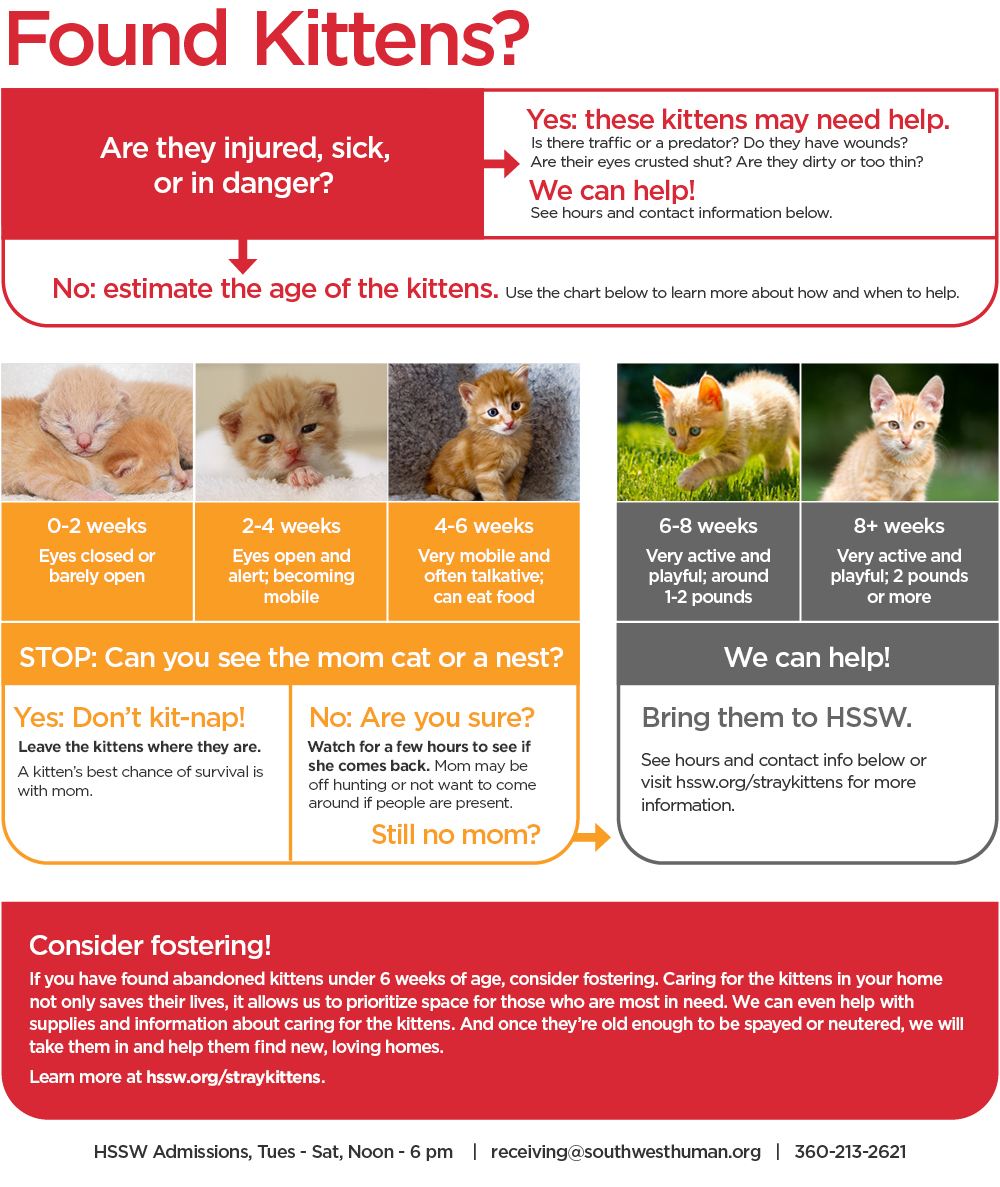
Lost and Stray Kittens
How and when to help
Unless they're in immediate danger or sick, kittens should stay where they are. Many well-intentioned rescuers unintentionally orphan stray kittens whose mother may be in the area. Kittens who are able to stay safely with their mom have a much better chance of survival and separating them from mom can seriously compromise the health of the kitten.
This Kitten Flow Chart can assist you in determining if kittens are in need of rescue.
If the kittens are sick or in danger, you may bring them to HSSW during regular hours or consider fostering them in your home if you are willing. Fostering in home allows us to prioritize space and resources for sick and injured cats and kittens.
-
When to Rescue Kittens
If you find kittens, don't rush to the rescue right away - you may unintentionally orphan kittens, putting them at greater risk. Consider the information below when you find kittens.
If you have found kittens who are sick, injured, or if you need help from our team, please click here for contact information.
Is mom with the kittens?
Even if you can't see her, mom may be near by. She may be hunting, taking a break, or even hiding from you. As long as the kittens are safe from immediate danger and hazardous conditions, give mom time to come back. If mom still hasn't returned, the kittens may need some help.
Are the kittens in any immediate danger?
As long as the kittens are not in any danger (look for dogs or other predators, traffic, exposure to weather conditions, etc.), it’s important to wait to see if mom is nearby. If the kittens are in immediate danger, they should be picked up right away. If you can, consider caring for the kittens yourself - if not, bring them to HSSW.
Are the kittens healthy?
Kittens who are sick or hurt need immediate care. Kittens who are dirty or skinny, kittens who have wounds or eyes that are crusted have likely been abandoned by mom. These kittens should be picked up immediately so they can receive medical care.
Additional support
Kittens will be found in a variety of circumstances, and it's not always easy to know if they need help. Our team is available to help you determine the best course of action. Need some help? Please click here for contact information.
-
Caring for Kittens at Home
Caring for bottle babies requires several feedings overnight and throughout the day. It's a lot of work, but it's also a rewarding experience that can make a lifesaving difference for kittens in need. Supporting them at home keeps them safe and healthy until they've reached 8 weeks of age and can be spayed/neutered and adopted.
Supplies for Young Kittens
Depending on their age, kittens need milk replacer, special bottles, and may need to eat every two hours (that means the middle of the night, too). These supplies can be readily found at your local pet store, and there are many online resources that can help with this process. Check out this guide to caring for neonatal kittens before attempting to care for kittens yourself.
Video Guides
Check out the following videos for tips and guides on caring for bottle baby kittens.
Caring for Bottle Babies
Bottle Feeding KittensWe Can Help
Depending on availability, we may be able to provide supplies and guidance if you want to care for kittens at home. If you need assistance, click here for more information about how to contact our team.
-
Additional Kitten Resources
Overnight Care for Kittens
If you found kittens that need to come to HSSW but it's outside of our business hours, you can keep them safe and warm at home overnight. Place them in an open box with a blanket and a heating pad (if available) on low to keep them warm. If possible, you can pick up kitten formula and a feeding bottle at your local pet store. You'll find information about determining a kitten's age and feeding needs below.
However, if the kittens are in need of emergency medical care, Please contact a local emergency vet.
Determining Kitten Age
Sometimes, an estimate of a kitten's age can help our team recommend the best course of action. This guide from ASPCA can help.
Learn more about stray kittens in our kit-napping blog post.
Questions? Contact us:
Admissions Team
360.213.2621 or [email protected]



